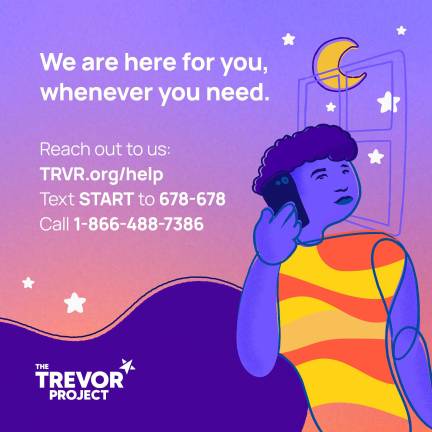‘The support doesn’t go away’
Local organizations say they will continue to help and support young people in crisis despite the federal government’s defunding of ‘Press 3’ services on the 988 suicide hotline which gave callers under age 25 the option to speak with LGBTQ-trained counselors.


The federal Substance Abuse and Mental Health Services Administration (SAMHSA) announced the closure of the 988 Suicide and Crisis Lifeline’s LGBTQ+ Youth Specialized Services program in June.
“The 988 Suicide & Crisis Lifeline will no longer silo LGBTQ+ youth services, also known as the “Press 3 option,” to focus on serving all help seekers, including those previously served through the Press 3 option,” SAMHSA said in its announcement.
“Everyone who contacts the 988 Lifeline will continue to receive access to skilled, caring, culturally competent crisis counselors who can help with suicidal, substance misuse, or mental health crises, or any other kind of emotional distress,” the SAMHSA statement continued. “Anyone who calls the Lifeline will continue to receive compassion and help.”
The 988 Suicide & Crisis Lifeline was launched in July 2022, two years after President Donald Trump signed the National Suicide Hotline Designation Act, making 988 the universal number for the national suicide prevention line. The bipartisan legislation noted that LGBTQ youths “are more than four times more likely to contemplate suicide than their peers and stated that SAMHSA “must be equipped to provide specialized resources” to high-risk populations, including LGBTQ youths.
In the 2024 fiscal year, funding for the “Press 3” services grew from $29.7 million to $33 million.
LGBTQ+ youth contacted the hotline more than 1.5 million times between its launch in September 2022 and its closure this past June.
Mental health professionals in the area say those numbers won’t go down. The question, though, is what they and their organizations can do to compensate.
‘The Well-Being Institute’
Richard Heyl de Ortiz, the executive director of the Hudson Valley LGBTQ+ Community Center, acknowledged the loss of funding, especially for local people.
The center, which celebrates its 20th anniversary this year, has offered programs through its Well-Being Institute for several years now, which Heyl de Ortiz argued have become very relevant in today’s environment. The institute provides counseling and referrals for individuals confronting mental or behavioral health issues, including those related to accepting their sexual or gender identities.
This, Heyl de Ortiz said, can also sometimes involve family members, adding that its structure is very “low barrier,” as they do not accept insurance or charge for the service.
However, he said the center’s services cannot fully make up for the loss of LGBTQ+ specific 988 funding because individuals in crisis need to be able to reach out at any point in the day. Some young people need to call outside of standard business hours, Heyl de Ortiz said, especially if they are living with non-accepting family members.
While he said he does not believe there is any “good spin” on eliminating the funding, he said it is important to remember that “we as a community have the strength and the ability to overcome.
“We have to work together now both in the board umbrella that is our LGBTQ+ community and with allies to make sure we are able to survive through this and be stronger on the other side of it,” Heyl de Ortiz added.
988 Lifeline Performance Metrics
‘Crisis Services’
Meaghan Bayer, the director of Crisis Services at the Orange County, N.Y., Mental Health Association, and Sean Gerow, its associate executive director, also weighed in on the decision.
The Mental Health Association provides a slew of community services, like housing funds, recovery programs, family support and employment services, among many others.
Bayer also leads the association’s Sexual Assault and Advocacy team, which offers 24/7 crisis response to sexual assault survivors, and Vet2Vet, providing peer-to-peer support for veterans and their families.
While it is “disappointing that the (Press 3) option won’t be there,” Gerow emphasized that “the support doesn’t go away.”
Instead of the Press 3 option, Gerow said individuals can speak to the association’s local counselors, who are also trained to provide this support.
Bayer added that the association’s resource guide has a LGBTQ+ specific tab, which their call-takers undergo training for.
Additionally, they can connect people who may be struggling with issues related to sexuality or gender identity to other outside resources, like the Trevor Project.
The Trevor Project is a leading suicide prevention and crisis intervention nonprofit organization for LGBTQ+ young people. The project’s crisis services remain available 24/7/365.
The Orange County Crisis Call Center receives local 988 calls and provides support 24/7. If someone wishes to be connected, he or she can dial 311 or 1-800-832-1200. Gerow and Bayer sometimes take calls at the crisis center themselves, if staff are on vacation or call out of work at the last minute.
By texting 845-391-1000, one can also reach Text4Teens, which Bayer said is sometimes a more comfortable option for young people as opposed to speaking directly on the phone.
“And our counselors, through that conversation, will then make the appropriate connection, whether that’s a connection across the street to local LGBTQ community resources, or it’s across the country,” Gerow said. “It makes no difference. We’ll make the right connection for that person at that time.”
In Pike County
Tina Clymer, the administrator for Carbon-Monroe-Pike Mental Health and Developmental Services, said her organization coordinates different support services for those with mental illness, while providing referrals, case management and community education.
She said people in crisis have a high level of need, highlighting that 988 is a particularly good resource because the number is easy to remember, unlike many more localized telephone crisis lines.
“LGBTQ+ folks have a very high rate of suicide, a high rate of depression and anxiety, often have trauma, and it is really a specialized need,” Clymer said. “It really helps them to be able to talk to other people who really understand what they are going through.”
But Clymer emphasized that even following the removal of the “Press 3” option, individuals can still reach out to 988 and be connected with services like the Trevor Project or local support systems.
Sussex County, N.J., PFlag chapter
Todd Gillespie is president of the Sussex County, N.J., PFlag chapter, an organization that centers around education and advocacy while offering community support activities.
Gillespie said that while PFlag chapter is not a mental health counseling organization, it does hold community support groups, leading “conversations on relevant topics with members of our community and allies who are interested in better supporting their LGBTQ loved ones.”
Each meeting contains an acknowledgement that if anybody in attendance is in crisis or is looking for a deeper conversation, their board can help them, but would refer them to an outside professional organization, like the Trevor Project.
The Trevor Project has been a major resource for staffing the suicide hotline, Gillespie said, providing the specialized LGBTQ support area, and are one of the organizations most greatly impacted by the administration’s decision.
Access to “affirming environments” before a crisis point, Gillespie added, helps to alleviate crisis spaces. PFlag is working to curate these “affirming and supporting and loving” environments for local LGBTQ+ people.
Community-supported organizations, like PFlag, are becoming more essential, he added. People come together through their work to demonstrate how they can “lead with love,” regardless of political action, Gillespie said.
For 24/7 crisis intervention services in Sussex County, NJ, one can call 988 or 973-383-0973 for the Newton Medical Center’s Psychiatric Emergency Services.
“We’ve been fighting battles for quite some time, and we’ve made a lot of progress for our community,” Gillespie said. “And we’re seeing a lot of that progress at risk right now. And I personally do have a concern that we are rolling back the clock at times where our LGBTQ community, and particularly our young community, are at greater risk. And that is a very unfair and unfortunate position to be in. Because we all deserve the freedom to be ourselves.”
“LGBTQ+ folks have a very high rate of suicide, a high rate of depression and anxiety, often have trauma, and it is really a specialized need. It really helps them to be able to talk to other people who really understand what they are going through.”
- Tina Clymer, the administrator for Carbon-Monroe-Pike Mental Health and Developmental Services
“We’re seeing a lot of that progress at risk right now. And I personally do have a concern that we are rolling back the clock at times where our LGBTQ community, and particularly our young community, are at greater risk. And that is a very unfair and unfortunate position to be in. Because we all deserve the freedom to be ourselves.”
- Todd Gillespie is president of the Sussex County, N.J. PFlag chapter
“We have to work together now both in the board umbrella that is our LGBTQ+ community and with allies to make sure we are able to survive through this and be stronger on the other side of it.”
- Richard Heyl de Ortiz, the executive director of the Hudson Valley LGBTQ+ Community Center
“Our counselors ... will make the appropriate connection, whether that’s a connection across the street to local LGBTQ community resources, or it’s across the country. It makes no difference. We’ll make the right connection for that person at that time.”
- Sean Gerow, associate executive director of Crisis Services at the Orange County, NY, Mental Health Association.